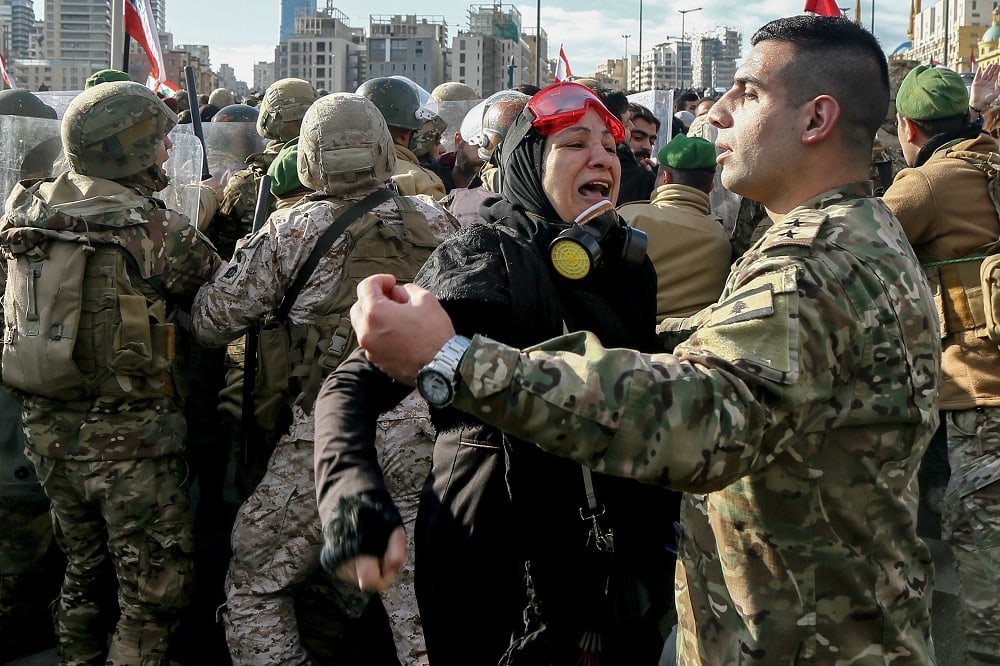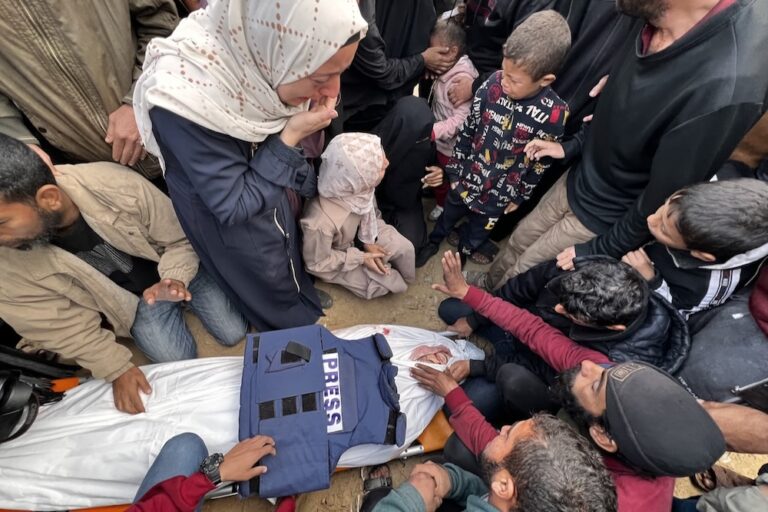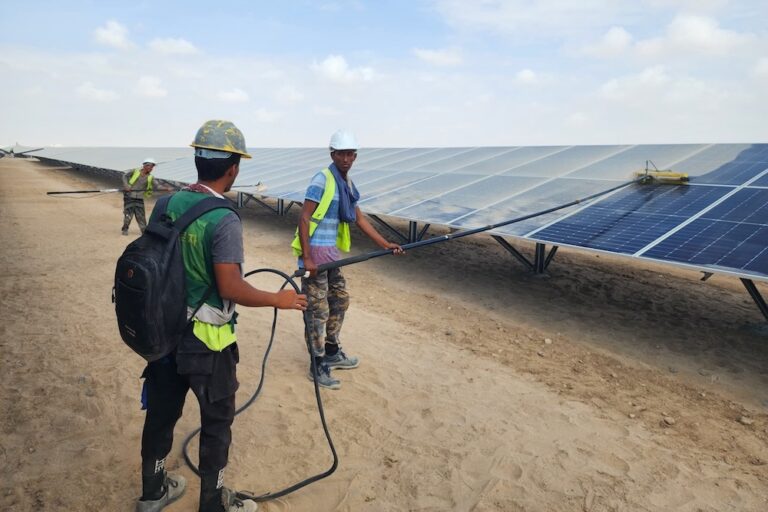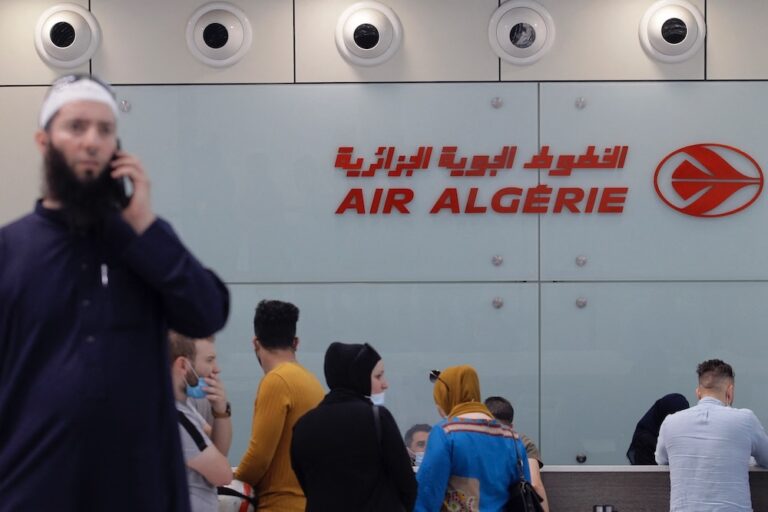February in Middle East and North Africa: A free expression roundup, based on member reports and news from the region.
Lebanon: From unprecedented expression to a crackdown
In the weeks following the launch of anti-government protests in Lebanon, free expression witnessed a visible increase in conventional ‘taboos’ and established norms in political discourse being broken. According to a new report from the Maharat Foundation, which monitored the first two months of popular protests, the public’s criticism of the entire political establishment represented an “unprecedented phenomenon” with free expression reaching a “peak” during this time period.
Today however, as protests persist, freedom of expression is becoming an increasingly volatile and shrinking space in Lebanon. Journalists and photographers covering the demonstrations have faced serious repercussions, including being targeted by water canons and rubber-coated steel bullets, as well as physical attacks and threats.
On 11 February, thousands of protesters blocked entrances to the heavily-barricaded parliament building in a bid to stop a vote of confidence for a new cabinet. Security forces encircling the building dispersed the crowds with water cannons, rubber bullets, beatings and tear gas canisters targeting protesters and leaving hundreds injured.
Perhaps evidence of how freedom of expression is becoming an increasingly contested space, Malak Alawiye, who became a icon for the protests when an image of her kicking a security guard went viral, was summoned to a military court last month and is now facing trial for “insulting and defaming security forces.”
She was not alone, with several activists and journalists making appearances before the military court in recent weeks, including activist Hassan Yassin who faces charges of “resisting security forces” during the protests. Activist Charbel Khoury was briefly detained and interrogated over a tweet criticizing an economic advisor to the Free Patriotic Movement, which he refused to delete, while blogger Gino Raidy and journalist Dima Sadek were also summoned on the same weekend, inspiring the “no to police repression” hashtag.
The worsening state of free expression in Lebanon garnered it a place on the CIVICUS Monitor watchlist, which said the country was experiencing a “serious deterioration of civic space”. According to the watch list, recent statistics show roughly 906 protesters were arrested and detained between 17 October 2019 and 31 January 2020, with around 546 protesters experiencing “excessive force during demonstrations or while in detention facilities.”
Palestine: Media violations and Facebook blocking
Protests in the West Bank against the proposed “deal of the century” were met with growing suppression by Israeli security forces last month. The public outcry over the deal and new Israeli settlement plans, saw security forces targeting protesters and intensified attacks, injuries and detainments of journalists covering the protests.
Attacks on Palestinians for exercising their freedom of expression have been on the rise recently. In an annual report from The Palestinian Center for Development and Media Freedoms (MADA), a total of 678 violations against media freedoms in the West Bank and Gaza Strip were documented in 2019, representing a 16% increase over the previous year.
Social media platforms like Facebook also increased their censorship of Palestinian content building on their 2016 agreement with the Israeli government to cooperate in combating content deemed “inciting.” Nearly 27% of the total violations were committed by Facebook and WhatsApp, including closure of media outlet pages, deleting or blocking accounts of Palestinian journalists, deleting content, or blocking page administrators. The violations have impacted journalists and activists, as well as hundreds of citizens whose accounts were also blocked.
According to the MADA report, while Facebook focuses on content Israel considers Palestinian “incitement” content, it also ignores the huge amount of Israeli hate speech and incitement against Palestinians. Underscoring this point, new research from the Arab Center for the Advancement of Social Media (7amleh) revealed that one violent post against Arabs and Palestinians was published on Israeli social networks every 64 seconds last year.
The annual Index of Racism and Incitement in Israeli Social Media report examined how last year’s Israeli elections contributed to an 8% rise in violent discourse against Palestinians and Arabs during the two rounds of elections. According to the report, Facebook remains the most prominent publishing network, hosting 41% of violent discourse, followed by Twitter, which hosted 30% of the content.
Iran: Information restrictions are impacting the COVID-19 crisis
In recent weeks, Iran has become one of the hardest hit countries dealing with the COVID-19 virus. As the outbreak claims more lives, observers have argued that government mismanagement and a lack of transparency and planning are becoming a major impediment to containing the virus.
ARTICLE 19 highlighted how Internet restrictions have created a government chokehold on the free flow of information, and subsequently control over what information is being shared. Iran’s Cyber Police have arrested dozens for spreading “misinformation” online, while a lack of government management has compelled medical staff to post online videos to keep the public informed.
Control over information about COVID-19 is in part an extension of expanding government controls over freedom of expression. While nationwide protests in November 2019 saw a surge of Internet blocking and shutdowns, authorities have since moved to cement control over online information. According to HRW, while hundreds were reportedly killed and thousands arrested during the protests, Internet shutdowns have made documenting the full extent of the crackdown, and holding perpetrators accountable, difficult.
Economic reporter Mohammad Mosaed was recently detained for several hours and his social media accounts suspended over posts critical of the government’s handling of the coronavirus outbreak. Mosaed was also arrested during the November 2019 protests for his tweets during the subsequent nationwide internet shutdown, and later released on bail.
Meanwhile, US sanctions have also played a critical role in denying Iranians access to information. American companies and organizations complying with the sanctions have essentially cut off access for Iranians to access updated information about the virus and its proliferation. Banned websites include vital resources like the real-time, pandemic tracking map developed by John Hopkins University.
New and noteworthy
In Morocco:
There is an alarming trend of activists, artists, and journalists being jailed for voicing their political opinions online, said HRW. At least 10 activists, artists, or other citizens have been arrested since September 2019 for peacefully expressing critical opinions via Facebook posts, YouTube videos, or rap songs. Meanwhile, judicial authorities issued orders to block the Asdaa Essaouira’s (Echoes of Essaouira) Facebook page, which was deemed in violation of the Press and Publishing Law. According to the Arab Network for Human Rights Information (ANHRI), Moroccan authorities have employed intimidation against websites’ owners and administrators to block at least 1,000 websites in the country throughout 2019.
In the UAE:
As the international literary community gathered for the first Hay Festival in Abu Dhabi, IFEX and over 60 civil society organizations, writers, and notable intellectuals called on Emirati authorities to release detained human rights defenders, including activist, writer and poet Ahmed Mansoor. The letter highlighted how prisoners of conscience like Mansoor, including human rights lawyers Dr Mohammed Al-Roken and Dr Mohammed Al-Mansoori, have faced mistreatment in prison, including being denied access to books and reading materials. Based on recent reports, Mansoor has been on a liquid-only hunger strike for over five months to protest his prison conditions.
In Bahrain:
Marking the ninth anniversary of the Bahrain uprising, the state of free expression and the mistreatment of political prisoners was brought to the forefront last month. IFEX member Americans for Democracy and Human Rights in Bahrain (ADHRB) organized a solidarity stand in cities around the world to call attention to imprisoned human rights defenders like Nabeel Rajab and Abdulhadi Al-Khawaja. The organization also submitted a written statement ahead of the 43rd session of the United Nations Human Rights Council, highlighting Bahrain’s continued failure to implement its UPR recommendations while continuing to curb domestic dissent.
Also in Lebanon:
New research from Social Media Exchange (SMEX) assessed the transparency of the country’s 114 Internet Service Providers (ISPs) and found the majority do not provide privacy policies or terms of service, keeping users in the dark about how ISPs are storing their data and who has access to it.
Also in Palestine:
The Palestine Digital Activism Forum organized by 7amleh was set to take place on 24 March, but has since been transformed into an online event amid global health concerns. The event will bring together organizations and people working in the human rights, digital media, and social sectors to discuss critical issues in the Palestinian digital activism arena. Check here for the agenda.



